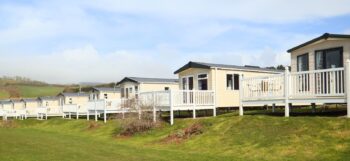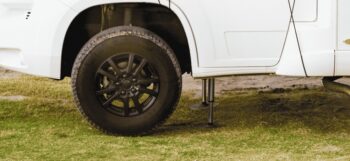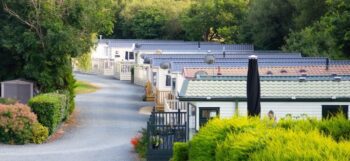As autumn begins to settle in, it's a good idea to start thinking about preparing your park home for the colder months ahead.
Proper autumn park home maintenance isn’t just about keeping your home safe and warm—it's also crucial for managing your insurance costs.
Neglecting these tasks could lead to higher premiums or worse still, significant damage that leaves you out of pocket.
In this article, we'll explore autumn park home maintenance tips that will help you protect your home and keep your insurance premiums in check.
Why autumn park home maintenance is crucial
Preserving comfort and safety
Preparing your park home for the turn of the season is vital to ensuring that it remains a warm and secure environment throughout autumn and winter. A well-maintained home is less likely to experience issues like drafts, leaks, or heating failures, all of which can make your living space uncomfortable and even unsafe. Taking the time to inspect and repair your park home now can prevent these problems from arising when the weather turns colder.
Essential autumn park home maintenance tips
To get you started, here’s a list of maintenance tasks that will help keep your park home in top condition this autumn:
Inspect roof and gutters
The roof and gutters are your home’s first line of defence against the elements. Start by checking the roof for any signs of damage, such as missing or cracked tiles, which could lead to leaks. It's also essential to clear your gutters of leaves and debris. Blocked gutters can cause water to overflow, leading to water damage to your walls and foundations, if left unchecked.

Check your heating system
When the temperature drops, it’s tempting to fire up your central heating. Be ready, by ensuring that your boiler is serviced to run efficiently and safely. Air trapped in your heating system can make it work harder than it needs to. Bleeding your radiators is essential for removing trapped air, which will be identified by the following:
- Cold Spots on Radiators - If the top part of the radiator is cooler than the bottom, it’s a sign that air is trapped in the radiator, preventing hot water from fully circulating. Certain radiators in your home may not heat up as efficiently as others due to trapped air in the pipes or radiators themselves.
- Gurgling or Hissing Noises - If you hear gurgling, bubbling, or hissing noises coming from the radiators or boiler, it’s a typical sign of trapped air in the system.
- Radiator Takes a Long Time to Heat - When a radiator takes longer than usual to heat up, trapped air might be blocking the flow of hot water.
- Boiler Pressure Drops - Trapped air can sometimes cause pressure in the boiler to drop below the normal operating level. If the pressure gauge on the boiler shows a lower than usual reading, air in the system could be a contributing factor.
How to bleed your radiators
Use a radiator key to open the valve and let the trapped air escape. Hold a cloth under the valve to catch any water, and once water starts flowing steadily, close the valve. After bleeding radiators, the boiler may need to be re-pressurised to ensure proper function.

Seal gaps and cracks
Gaps around windows, doors, and skirting can allow cold air to seep in, making your home harder to heat and keep at a constant temperature. Inspect these areas and apply weatherstripping or sealant to prevent drafts. Carrying out this task could see a reduction in your energy costs.

Clean and treat decking
If your park home has wooden decking, it’s important to clean and treat it before the wet weather sets in. Moss and algae can make decking slippery and dangerous, while untreated wood is susceptible to rot.

Prune trees and bushes
Overhanging branches could cause significant damage to your park home during storms, and fallen leaves can clog your gutters. Prune back any trees or bushes close to your home to prevent these issues from arising.

Check pipes and insulation
Frozen pipes can burst and cause extensive damage to your home. Insulate any exposed pipes to help protect them from freezing temperatures. Also, check the underfloor insulation to ensure it’s in good condition and replace it if necessary.

Inspect exterior walls
Cracks and peeling paint on exterior walls can allow moisture to seep in, leading to dampness and structural damage. Inspect your walls and repair any issues promptly to keep your home dry and in good condition.

Service smoke and co detectors
Safety is paramount in your park home, and smoke and carbon monoxide detectors play a crucial role. Test these devices regularly and replace the batteries to ensure they are functioning correctly.

Drain outside taps
Water left in outdoor taps can freeze and cause the pipes to burst. Shut off the water supply to outdoor taps and drain them to prevent this from happening.

Prepare for Storms
Autumn often brings strong winds and heavy rain. Secure any loose outdoor items, such as garden furniture or ornaments, to prevent them from causing damage in a storm.

Improving energy efficiency through The ECO4 Scheme
The government-backed ECO4 scheme is funded through a unique mechanism where energy companies contribute 20% of their profits annually to a dedicated fund. This fund is then used to provide grants for upgrading homes, and the great news is the scheme also extends to park homes!
The ECO4 Scheme is time-sensitive, with funding available until 2026, so now is the time to act. The government has allocated £4 billion for energy efficiency and heating measures, emphasising the urgency for homeowners to seize this opportunity. Learn more about the scheme in our article here.
Understanding the Impact of Maintenance on Insurance
Insurance premium increases
Failing to maintain your park home can lead to increased insurance premiums. When you make a claim, your insurer may raise your premiums at renewal time. By staying on top of maintenance, you can help to reduce the likelihood of needing to make a claim, which helps keep your insurance costs down.
We’ve been supporting park home owners with park home insurance for more than 30 years. Our policy is underwritten by a specialist park home insurer and has been shaped to meet the specific needs of park home owners, based on feedback from our customers.
We’ve included Legal Expenses cover1 and 24 hour Home Emergency cover2 as standard, to offer the protection you may need, all in the one policy. And you can enhance your policy further with optional extras such as Key Cover1 or Home Excess protection3 to offer you additional peace of mind!
Our experienced and friendly agents can explain the options, so you build the policy that meets your needs. Call us today on 01480 402 460 to see how we can help.
Terms and conditions, limitations, exclusions and acceptance criteria apply. Policy enhancements are subject to an additional premium.
- Family legal expenses and key cover underwritten by ARAG plc, a cover holder of the insurer, ARAG Allgemeine Versicherungs-AG Branch UK
- Home emergency cover is underwritten by Astrenska Insurance Limited, a trading style of Collinson Insurance Services Limited
- Home excess protection is underwritten by Astrenska Insurance Limited
Disclaimer: The sole purpose of this article is to provide guidance on the issues covered. This article is not intended to give legal advice, and, accordingly, it should not be relied upon. It should not be regarded as a comprehensive statement of the law and/or market practice in this area. We make no claims as to the completeness or accuracy of the information contained herein or in the links which were live at the date of publication. You should not act upon (or should refrain from acting upon) information in this publication without first seeking specific legal and/or specialist advice. Arthur J. Gallagher Insurance Brokers Limited trading as Lifesure accepts no liability for any inaccuracy, omission or mistake in this publication, nor will we be responsible for any loss which may be suffered as a result of any person relying on the information contained herein.
FP1064-2025











